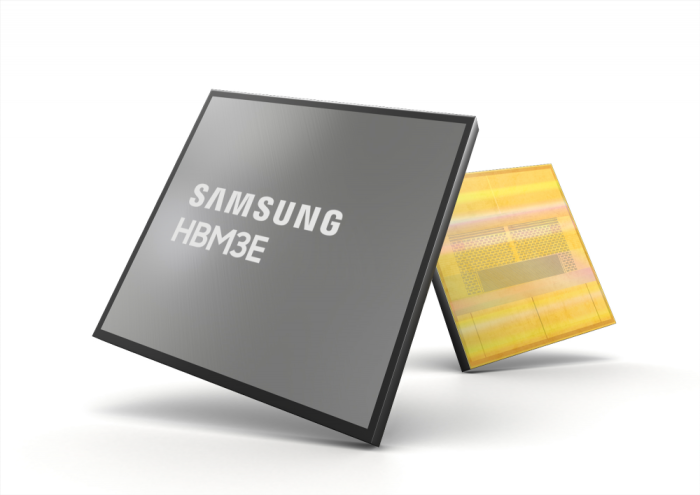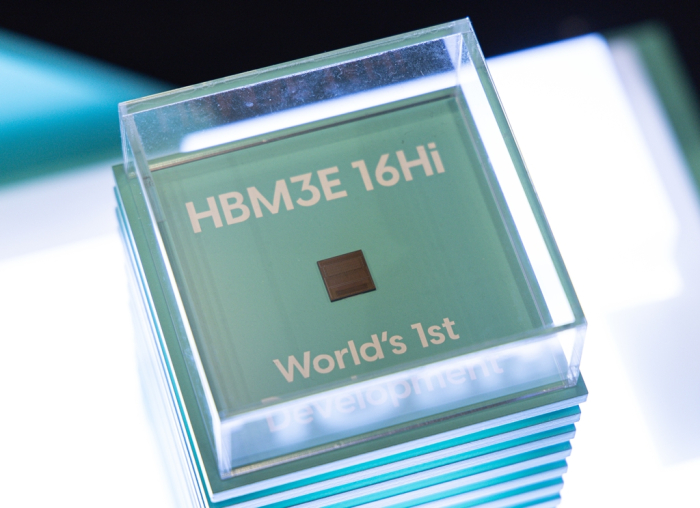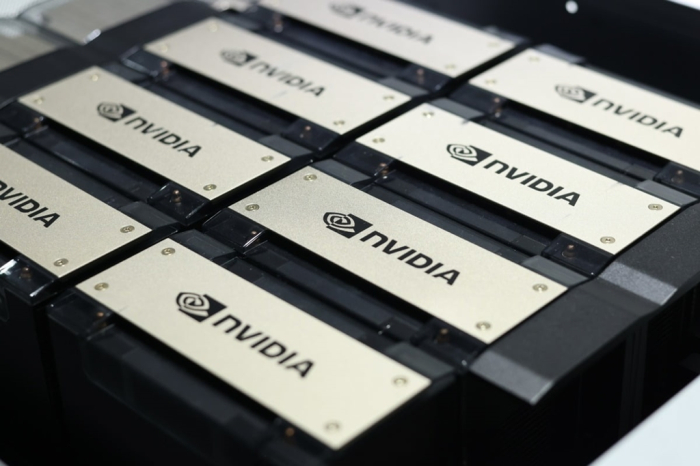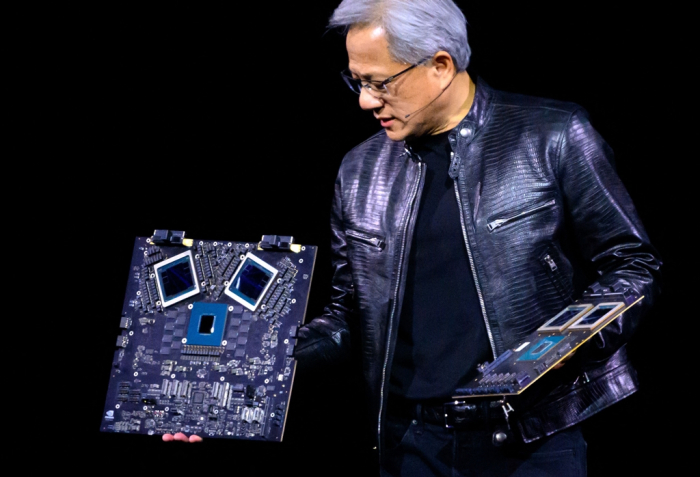Samsung in talks to supply customized HBM4 to Nvidia, Broadcom, Google
The Korean chipmaker has already shipped HBM3E samples to its customers, with sales likely to begin in the second quarter
By 11 HOURS AGO
LG Chem to sell water filter business to Glenwood PE for $692 million


KT&G eyes overseas M&A after rejecting activist fund's offer


Kyobo Life poised to buy Japan’s SBI Group-owned savings bank


StockX in merger talks with Naver’s online reseller Kream


Meritz backs half of ex-manager’s $210 mn hedge fund



Samsung Electronics Co., the world’s leading memory chipmaker, is in talks to supply customized sixth-generation high-bandwidth memory, or HBM4, chips to major AI chipmakers, including Nvidia Corp., Broadcom Inc. and Google LLC.
The South Korean tech giant expects to supply HBM4 to its clients as early as the first half of 2026, company executives and industry sources said on Wednesday.
The move is part of Samsung’s strategic push to seize the lead in the rapidly intensifying AI semiconductor race, outpacing crosstown rival and the world’s top HBM chip supplier SK Hynix Inc.
The move also underscores Samsung’s ambition to dominate the critical memory segment powering advanced artificial intelligence accelerators used for data training and inference, analysts said.

During its first-quarter earnings call with analysts, Kim Jae-joon, executive vice president of Samsung’s memory business, said the company is already collaborating with multiple customers on custom versions based on both HBM4 and the enhanced HBM4E.
“HBM4 is under development on schedule with mass production targeted for the second half of this year,” he said, adding that commercial supplies of HBM4 chips are expected to begin in 2026.
HBM3E SAMPLES OUT TO CUSTOMERS
“We have completed the supply of improved HBM3E samples to our major customers, and we expect the number of purchasing firms to increase from the second quarter,” Kim said.

Although Samsung has passed Nvidia’s qualification tests for its HBM3 chips, it is yet to supply the products to the US chip designer.
He noted that Samsung’s HBM sales hit a trough in the first quarter, but a significant rebound would be gradual.
To catch up to SK Hynix, Samsung said last September that it is collaborating with foundry archrival Taiwan Semiconductor Manufacturing Company Ltd. (TSMC) to jointly develop HBM4.
The sixth-generation high-performance memory chip is expected to be fitted in Nvidia’s next-generation graphics architecture Vera Rubin, the successor of the Blackwell AI chip.
HBM4 PUSH
The HBM4 push comes as Samsung aims to reverse recent setbacks in its semiconductor division, which saw memory revenue fall 17% on-quarter to 19.1 trillion won ($13.4 billion) in the first quarter.

The company blamed the dip on US export controls impacting advanced chip shipments and deferred demand ahead of its latest HBM3E upgrade.
Samsung's semiconductor division reported 25.1 trillion won in total revenue for the quarter, with operating profit reaching 1.1 trillion won, a marked turnaround from losses in the year-earlier period.
As demand for AI infrastructure continues to surge, driven by generative AI and large-scale language models, Samsung is betting heavily on its ability to meet future HBM needs.
“We are making the necessary investments to respond to demand for both HBM4 and HBM4E,” Kim said.
Samsung said it is phasing out production of older HBM2E and DDR4 memory chips, in line with its strategy to concentrate resources on premium products with higher margins.

FINAL Q1 RESULTS
On Wednesday, Samsung posted 6.69 trillion won in overall first-quarter operating profit on sales of 79.14 trillion won, up 1.2% and 10.1%, respectively, from a year earlier.
Performance was bolstered by strong results from its Mobile eXperience (MX) and Networks units, which together generated 4.3 trillion won in operating profit, a 22.5% on-year increase.
Its first-quarter net profit was 8.22 trillion won, up 21.7% from 6.75 trillion won a year earlier. The earnings exceeded market expectations.

Samsung attributed the better-than-expected bottom line to robust smartphone sales. Its latest Galaxy S25 smartphones debuted in January.
Samsung struck a cautiously optimistic tone on future earnings, pointing to easing global policy uncertainties and growing AI server investments as tailwinds for the remainder of the year.
“Demand for memory semiconductors is expected to improve, driven by expanding investments in AI servers and the proliferation of on-device AI,” said Park Soon-cheol, executive vice president of corporate management, during the earnings call.
Write to Jeong-Soo Hwang and Chae-Yeon Kim at hjs@hankyung.com
In-Soo Nam edited this article.
-
 Tech, Media & TelecomSamsung fends off Apple to reclaim global smartphone crown in Q1
Tech, Media & TelecomSamsung fends off Apple to reclaim global smartphone crown in Q1Apr 17, 2025 (Gmt+09:00)
2 Min read -
 Tech, Media & TelecomSamsung, Google to unveil smart glasses next year in deeper AI alliance
Tech, Media & TelecomSamsung, Google to unveil smart glasses next year in deeper AI allianceApr 11, 2025 (Gmt+09:00)
3 Min read -
 EarningsSamsung’s Q1 profit beats expectations; Q2 outlook murky on tariff war
EarningsSamsung’s Q1 profit beats expectations; Q2 outlook murky on tariff warApr 08, 2025 (Gmt+09:00)
3 Min read -
 Korean chipmakersSK Hynix ships world’s first 12-layer HBM4 samples early
Korean chipmakersSK Hynix ships world’s first 12-layer HBM4 samples earlyMar 19, 2025 (Gmt+09:00)
3 Min read -
 Korean chipmakersSamsung Electronics, TSMC tie up for HBM4 AI chip development
Korean chipmakersSamsung Electronics, TSMC tie up for HBM4 AI chip developmentSep 05, 2024 (Gmt+09:00)
3 Min read -
 EarningsSK Hynix to supply 12-layer HBM3E to Nvidia in Q4; profit soars in Q2
EarningsSK Hynix to supply 12-layer HBM3E to Nvidia in Q4; profit soars in Q2Jul 25, 2024 (Gmt+09:00)
3 Min read -
 Korean chipmakersSamsung set to supply HBM3 to Nvidia, develops 32 Gb DDR5 chip
Korean chipmakersSamsung set to supply HBM3 to Nvidia, develops 32 Gb DDR5 chipSep 01, 2023 (Gmt+09:00)
4 Min read


